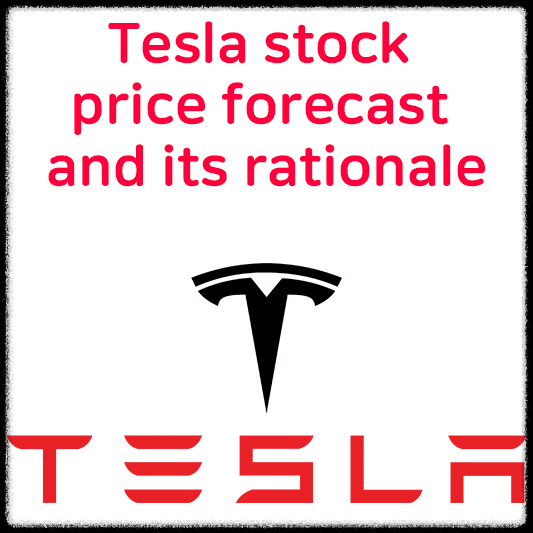Tesla's stock(tsla) outlook and rationale rely on a variety of factors, including financial performance, competitiveness, innovation pipelines, regulatory environments, and consumer demand. Here are some of the factors that may affect Tesla's stock outlook and rationale.

1.tesla stock target price forecast
Tesla (NASDAQ: TSLA) is an electric vehicle and clean energy leader that has disrupted the automotive industry with innovative products and visions. Tesla shares have been volatile over the past year, reaching a high of $364.07 in January 2021 and a low of $101.81 in October 2021. Tesla shares were down 0.25% from the previous day at $185.06 as of April 6, 2023.
Tesla's price target is an analyst prediction average covering the company. According to Zacks Investment Research, Tesla has an average price target of $220.25, based on the short-term price target of 23 analysts. Estimates range from a low of $85.00 to a high of $366.67. The average price target shows an 18.72% increase from the last closing price of $185.52. Based on 38 analyst ratings last year, Tesla's stock consensus rating is currently based on 4 sales ratings, 15 pending ratings, and 19 TSLA purchase ratings, according to MarketBeat. Tesla has an average 12-month price target of $222.74, with a high price target of $430.33 and a low price target of 33.33㎡. According to Crowd Wisdom360, the aggregated forecast is for an annual price of $243.
2.Reasons for Tesla's Price Target
- Financial performance is as follows:
Tesla has been rapidly expanding its revenue and revenue with the recent increase in car supply and expansion into new markets and segments. In 2021, Tesla reported a 28% year-on-year increase to $2.46 billion and a net profit of $31.54 billion, up 214% year-on-year. Tesla also achieved positive free cash flow of $2.79 billion in 2021, marking the third consecutive year of positive free cash flow. But Tesla also faces challenges such as rising costs, supply chain disruptions and currency fluctuations, which could impact future profitability and cash flow.
- Competitive position:
Tesla has a strong competitive edge in the EV market and offers a wide range of products to suit consumers' different segments and tastes. Tesla vehicles are known for their high performance, design, technology, safety and environmental benefits. Tesla also has a solid customer base and a strong brand image, giving it an edge over its competitors. However, Tesla is also fiercely competing between existing automakers and new entrants in the electric vehicle sector.They are investing heavily in developing and launching their own electric vehicles, improving battery technology and charging infrastructure.
- This is an innovative pipeline:
Tesla has a strong innovation pipeline aimed at delivering new products and services that can increase its growth potential and competitive advantage. Some of Tesla's key projects include Cybertruck, an electric pickup truck, Semi, a high-performance sports car, Roadster, a compact SUV, full self-driving (FSD) software, and Solarloop, which integrate solar panels into roof tiles to adopt home and commercial battery systems, Powerwall and Powerpack. But Tesla also faces risks such as delays, technical glitches and regulatory barriers.
3.Challenges for Tesla to Face in the Future
Here Are Some Challenges Tesla Will Face In The Future:
- Regulatory uncertainty exists:
Tesla is operating in a highly regulated industry that is subject to a variety of laws and regulations on safety, emissions, environmental protection, consumer protection, and more. These laws and regulations may vary by country and region and may change over time. Tesla may find it difficult to comply with these laws.Failure to do so may result in fines, penalties, litigation or reputation damage. Tesla, for example, faces regulatory scrutiny and legal challenges in some U.S. states over a direct sales model that bypasses existing dealerships. Tesla is also facing regulatory barriers and delays in launching FSD software in some markets due to safety concerns and ethical concerns.
- The supply chain is in disarray:
Tesla relies on a complex, global supply chain to procure materials, parts, and parts needed to manufacture its products. Tesla may experience disruptions in its supply chain due to factors such as natural disasters, pandemics, trade wars, tariffs, labor disputes, shortages, and quality issues. These disruptions could impact Tesla's production capacity, delivery, costs, and margins. Tesla, for example, faces the challenge of securing enough chips and batteries for cars amid global semiconductor shortages and rising demand for electric vehicles.
- Competitive burden:
Tesla's competition is intensifying between existing automakers and new entrants in the electric vehicle sector.They are investing heavily in developing and launching their own electric vehicles, improving battery technology and charging infrastructure. Some of these competitors have more funding, manufacturing capabilities, distribution networks, and customer loyalty than Tesla. These competitors sometimes offer cheaper, better or more diverse products than Tesla's. Tesla, for example, is facing competition from companies such as Volkswagen, Toyota, General Motors, Ford, Hyundai, Nio, Lucid Motors and Rivian.
- Customer satisfaction is as follows:
Tesla relies on customer satisfaction and word of mouth to maintain and grow its customer base and brand image. Tesla may have difficulty gaining customer satisfaction due to factors such as product quality issues, service delays, software bugs, cyberattacks, and recalls. These factors can affect Tesla's reputation, customer loyalty, and sales. Tesla, for example, is facing complaints or lawsuits from some customers over issues such as defective paint, defective touch screens and defective batteries.
댓글